
With 10 original books to his name and several Chinese translations from English and German under his belt, Chancellor Tong Shijun knows a thing or two about good books. Here, he recommends a few favorite titles from among the hundreds of books that line his office shelves.
The Human Condition, by Hannah Arendt (1958)
Arendt asks us to value that which always remains constant in our human capabilities: our ability to act in order to create new beginnings, to improve the state of affairs brought about by previous actions. Although Arendt wrote this book many years ago, her attempt to reach a “reconsideration of the human condition from the vantage point of our newest experiences and our most recent fears” is still quite relevant to our current situation, where many of us continue to find ourselves “overcome by the advent of a new and yet unknown age.”
Extraordinary, Ordinary People: A Memoir of Family, by Condoleezza Rice (2010)
何为良好生活 (What Is a Life as Well-Being?), By Chen Jiaying (2015)
No matter our age, background, or personal experience, one question endures throughout our lives: “How should I live?” Chen Jiaying draws upon his deep knowledge of both Chinese and Western philosophy (he has translated key works by Heidegger and Wittgenstein into Chinese) and reflections from his own life as a contemporary Chinese individual to offer practicable principles and insights for readers who, like the author, feel that “honest reflection is one of life’s great pleasures.”
Habermas: A Biography, By Stephan Müller-Doohm, translated into English by Daniel Steuer (2014/2016)
2000年以来的西方 (The Intellectual World of the West Since 2000), By Liu Qing (2021)
Those interested in understanding the West from a Chinese perspective will be intrigued to read this retrospective by political scientist and political philosopher Liu Qing. Liu highlights and interprets some of the most salient events in intellectual life in the West, assessing these events’ relationship to global societal dilemmas between cosmopolitanism and identity politics.

